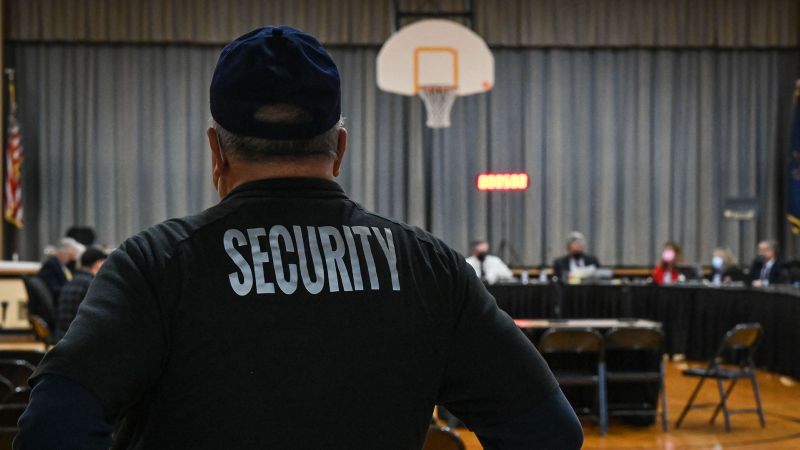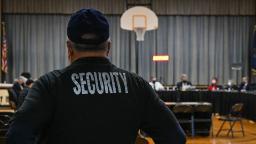

CNN
—
Republicans on the House Judiciary Committee claim in a new report that local law enforcement pushback to a memo issued by Attorney General Merrick Garland in 2021 on threats to school boards around the country supports their conclusion that there was “no legitimate basis” for the directive.
House Republicans also claim in the report, which provides an update to their investigation, that the memo must have been issued for political purposes – but the report does not include any direct evidence to support the allegation that any decision made by the DOJ was politically influenced.
Democrats have been quick to criticize the House GOP report, saying it lacks evidence to back up its claims.
The top Democrat on the House Judiciary panel, Democratic Rep. Jerry Nadler, criticized the committee’s chair in a statement to CNN, “Jim Jordan has cherry picked a few sentences from hundreds of pages of documents to manufacture a book report on a debunked conspiracy theory. As with all of his recent work, he has produced little or no new evidence to support his claims.”
The GOP report comes as Republicans have accused the Biden administration of targeting conservative speech at school boards, a claim that Democrats have pushed back on with Garland in the center of the political controversy. Republicans have also sought to elevate the issue of so-called parental rights in the classroom as a key priority for the party.
Garland’s 2021 memo, which ordered federal law enforcement to meet with local authorities around the country to “facilitate the discussion of strategies for addressing threats” against education personnel, came after a spate of protests and other disruptions targeting school officials over Covid policies, school curriculum and other issues.
The National School Boards Association asked the Justice Department at the time to address these issues, and wrote to President Joe Biden asking for federal help to address the violence and threats against school administrators. But the association later apologized for “some of the language” in the letter, which said the “heinous actions could be the equivalent to a form of domestic terrorism.”
The memo issued by Garland specified that it was concerned with “illegal” threats and harassment – but the memo never equated parents to domestic terrorists.
Drawing on information gleaned in subpoenaed documents from the Department of Justice, FBI and the Department of Education, the committee, led by Republican Rep. Jim Jordan of Ohio, claims that local law enforcement officials were “generally opposed” to the memo and that there was no evidence that there was a legitimate nationwide threat to school boards – and makes the claim that there was “no legitimate basis” for the memo.
House Judiciary Committee Republicans also allege in their report, without providing direct evidence to back up the claim, that based on “the initial set of material produced in response to the subpoenas, it is apparent that the Biden Administration misused federal law-enforcement and counterterrorism resources for political purposes.”
The report also claims that that there was collusion between the Biden White House, NSBA, the Justice Department and Department of Education, but frames many of the examples of communication cited in the report between the agencies as inconclusive. The NSBA and the Department of Education have denied any collusion took place.
House Republicans have repeatedly called on Garland to rescind his memo, but the memo addresses meetings that happened two years ago.
A spokesperson for the Department of Justice declined to comment. A person familiar with the Justice Department’s work, however, told CNN that “The documents show that the memo, which was issued in October 2021, directed US Attorneys to convene meetings within 30 days to learn more about threats against school officials. That has long since happened. DOJ did not hold back in turning over to Congress the feedback from different US Attorney’s offices. Some offices found the meetings helpful, a few didn’t. The memo’s purpose was to open these lines of communication and that is what DOJ did.”
Garland told the Senate Judiciary Committee earlier this month that the memo was “aimed at violence and threats of violence against a whole host of school personnel. It was not aimed at parents making complaints to their school board. And it came in the context of a whole series of other kinds of violent threats and violence against other public officials.”
Tuesday’s report highlighted three examples of local law enforcement opposing the implementation of Garland’s October 4 memo based on 448 pages provided by DOJ as the result of a subpoena.
One of those examples came from then-US Attorney for the Southern District of Illinois, Steven Weinhoeft. “No one I spoke with in law enforcement seemed to think that there is a serious national threat directed at school boards, which gave the impression that our priorities are misapplied. Some expressed concerns that the federal government was meddling in an area where it does not belong,” Weinhoeft said, according to the report.
Assistant US Attorney for the District of Montana Joe Thaggard acknowledged local law enforcement reported examples of criminal threats against school administrators, but advised that “local law enforcement authorities are best suited to address” them.
US Attorney for the Northern District of West Virginia William Ihlenfeld II reported that the “Superintendent of the West Virginia State Police, explained his belief that most situations involving threats or harassment of school officials can be handled by state and local officials.”
In addition to some pushback from local law enforcement, House Judiciary Committee Republicans claimed there was confusion over how to message Garland’s directive to the public.
The report also cites four examples to claim there was “a lack of enthusiasm and participation” in the meetings mandated by DOJ as the result of Garland’s memo.
The report also claims that the FBI opened 25 assessment cases related to school board threats, but only one warranted a full investigation and the remainder were referred to state and local authorities. None have led to federal prosecutions.
The assessment cases, known as “Guardian Assessments,” and reported through the FBI National Threat Operations Center are akin to a tip, and typically most do not lead to investigations.
Republicans have seized on the threat tags, created by the FBI, to internally track cases about school board threats to accuse the FBI and the Biden administration of trying to stomp out conservative speech at school boards. But the creation of an internal database does not mean the FBI initiated any sort of crackdown against parents.
The report lists a few examples of individuals being interviewed by the FBI. Republicans claim the investigations were politically motivated, but the report does not provide direct evidence to support that claim and does not detail whether full investigations were opened or if any charges were brought in the examples given.
Among them, an FBI field office interviewed a mother who told a local school board “we are coming for you” after a complaint alleged the mother was a threat because she belonged to a “right wing mom’s group” and “is a gun owner.”
Another FBI field office opened an investigation into a father who opposed mask mandates after a complaint was made that the father “fit the profile of an insurrectionist” and “has a lot of guns and threatens to use them.”
When asked for comment on the report, the FBI referred CNN to a statement that Director Christopher Wray made last month that “the FBI is not now, nor will it ever be in business of policing speech at school board meetings or anywhere else. Now when it comes to violence, threats of violence, we’re going to do like we always have, work with our state local law enforcement partners to deal with violence, but we are not in the business of policing speech by parents at school board meetings or anywhere else.”
CORRECTION: This story has been corrected to reflect that the FBI National Threat Operations Center does not conduct interviews.
